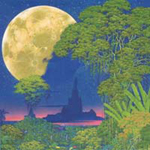Seiken Densetsu 3 Original Soundtrack
 |
Album Title: Seiken Densetsu 3 Original Soundtrack |
| Record Label: NTT Publishing |
|
| Catalog No.: PSCN-5026/28 (1st Edition); NTCP-5026/8 (2nd Edition) |
|
| Release Date: August 25, 1995; October 1, 2004 |
|
| Purchase: Buy at CDJapan |
Overview
Regarded by many as the last great game of the Mana series, the Super Nintendo’s Seiken Densetsu 3 was never given an overseas release unlike its successful predecessor Secret of Mana. Thanks to the import market, Hiroki Kikuta’s soundtrack album for the title has nevertheless become widely popular. The three disc score builds on the musicality of Secret of Mana in numerous ways, while pushing Square’s scores creatively and technically in unprecedented ways.
Body
Kikuta establishes continuity with Secret of Mana right away with “Where Angels Fear to Tread”. The first part of the composition features a sombre yet beautiful duet for flute and piano, while the climax of the composition is a brisk and uplifting arrangement of Secret of Mana‘s title theme. It’s a great way to welcome gamers back and set the tone for the title. As exemplified by the two-tiered title theme, the compositions here are generally more elaborate than those on the Secret of Mana soundtrack. The castle theme “Whiz Kid” is a more subtle example of Kikuta’s expansive approach. He slowly elaborates on the central march motif of the composition, before shifting to two distinct passages, yielding an entire two minutes of development before the loop. It’s a great way to capture the vastness and history of the location.
Yet while most compositions are longer, they are generally thinner — created with six rather than eight channels due to hardware limitations. Kikuta disguises this by integrating only the most important forces into each of his compositions. For example, Wendel’s “Evening Star” features a deep and mystical soundscape despite using a a mere two or three forces at one time. The contrasting instrumental choices — piano, violin, harp, synth vocals — and their close harmonisation no doubt contributes to this illusion of richness. It also helps that the samples used are very high quality for the 16-bit era and often highly expressive. It’s easy to imagine the snares are rolling and the bells are tolling when the enemy march “Intolerance” plays in the game, while the flute resonating in “Fable” inspires such human emotions. Kikuta even dared to write the masterpiece “Meridian Child” for a larger synth orchestra.
Despite the darker premise, there are plenty of light-hearted themes throughout the soundtrack that exhibit Kikuta’s distinctive lyricism. The likes of “Ordinary People” and “Don’t Hunt the Fairy” demonstrate how much hummable, albeit unconventional, melodies can bring to an interactive experience. They’re neither complex nor fitting, but simply downright enjoyable. Other tracks such as “Weird Counterpoint” and “Few Paths Forbidden” also prove delightful out of context, yet are also effective scene-setters due to their exotic rhythmical influences. A few experimental outliers, such as the reggae-flavoured “Splash Hop”, Celtic-spirited “Damn Damn Drum”, or the bossa-nova “Powell”, ensure the soundtrack is even more unique and memorable. They further demonstrate that Kikuta is one of a kind, uniquely able to portray scenes and penetrate listeners while trying just about anything he feels like.
Of course, the action themes are once again where Kikuta’s eccentricity comes out the most. He doesn’t produce anything as jaw-dropping as “Danger” this time round in favour of tracks that integrate more snugly into the rest of the soundtrack, while still making an impact. A good example is “Black Soup”, which combines the ethnic tonalities and running through the soundtrack with percussive and string elements more typical of action themes. Others such as “Rolling Wire” and “Strange Medicine” feature irregular metres and chord progressions that send gamers into a spin. A few sound more out-of-place on the battle screen, for example the Indian grooves of “Obsession” or industrial percussion of “Secret of Mana”, but they’re striking and loveable nonetheless. Secret of Mana‘s final boss theme “Meridian Dance” also receives a nod with “Nuclear Fusion”, complete with a unified development section.
Kikuta’s attempts to raise the bar for Seiken Densetsu 3 are most evident at the climax of the score. Preceding Nobuo Uematsu’s accomplishments on Final Fantasy VI, Kikuta decided to write a multi-tiered final boss suite for the game, “Sacrifice”. The first movement is an unpredictable piece of quasi-orchestral horror scoring, the second movement is entirely dedicated to exploring tribal percussion polyrhythms, and, spanning a total of eight minutes, the final movement is a high-octane synth rock theme capturing Kikuta at his most melodically exuberant. There’s never a dull moment in this unprecedented suite. Kikuta also maturely underscored the 20 minute ending sequence, offering both sentimental orgel solos and satisfying orchestral tutti. Wanting to conclude the franchise and leave a legacy, Kikuta recapitulated several themes from Secret of Mana and Seiken Densetsu 3 at key moments.
Summary
The score for Seiken Densetsu 3 is bigger and better than Secret of Mana‘s for the most part. Reflecting Kikuta’s evolution as a musician, the compositions this time round are more inventive, developed, and memorable overall. Of course, the score may not resonate as much with overseas listeners as Secret of Mana‘s, given Seiken Densetsu 3 was never released overseas. However, those that enjoyed Secret of Mana‘s score and desire more can’t go wrong by purchasing the Seiken Densetsu 3 Original Sound Version.
Do you agree with the review and score? Let us know in the comments below!
4.5
Posted on August 1, 2012 by Chris Greening. Last modified on August 1, 2012.














